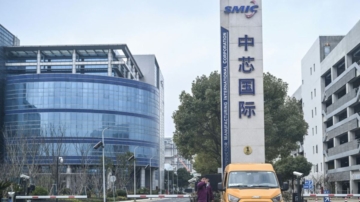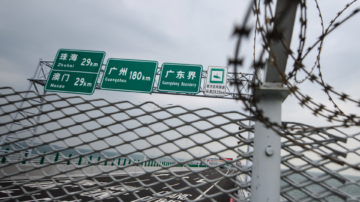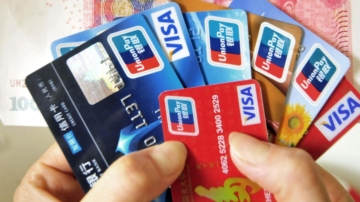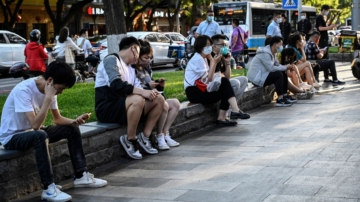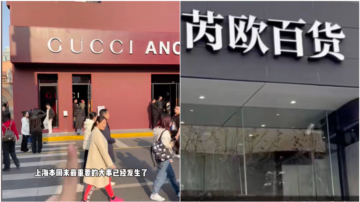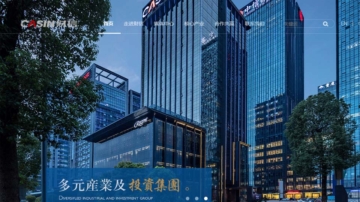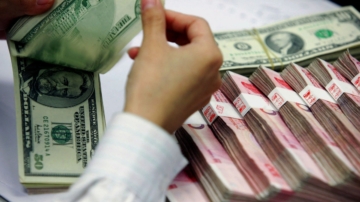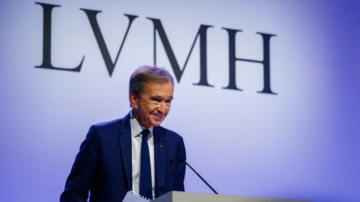【新唐人2012年7月9日訊】中國「人民銀行」宣佈自7月6號起,下調金融機構人民幣存貸款基準利率。其中,金融機構一年期存款基準利率下調0.25個百分點,一年期貸款基準利率下調0.31個百分點。此外,將金融機構貸款利率浮動自由度,增加到30%。這次降息距離6月8號那次首次降息,還不到一個月時間。專家形容中共當局是飲鴆止渴,為維持政權穩定,只好祭出保八大旗,降低失業率。
「中國農業銀行」高級宏觀分析師王靜文,在「中國特色的非對稱降息」的文章中說,如果不追究幅度和方式,單就短短一個月內連續兩次降息來看,確實反映出當前經濟形勢的惡化。
文章表示,上半年增長數據要到7月中旬才會公布,但肯定不會太好看,所以高層才會授意央行連續降息。二季度GDP肯定會跌到8%以下,連續第5個季度創出新低應該沒有懸念。而,秦皇島的煤炭庫存連續創出新高,用電量、貨運量等指標都疲弱不振,也都說明實體經濟不容樂觀。
據《財經》雜誌報導,「北大光華管理學院」教授、經濟學家張維迎在「中國企業家夏季高峰論壇」上表示:2008年的強烈經濟刺激政策,導致通貨膨脹,如今又一個月內兩次降息,想辦法刺激,如果現在又開始新一輪刺激,大規模的投資,對未來中國經濟是災難性的。
張維迎認為,中國經濟經歷了20年的快速增長,如今到了一個需要調整的階段,只有經歷一段低速增長,才能轉型,才會有更有希望的未來。但是,他表示:政府捨不得休息,一定要跑,可能結果會跑死掉。
另外,美國「普林斯頓大學」社會學博士程曉農指出,中共政府連續降息,很快的又要帶來通貨膨脹。
程曉農:「中共沒有辦法真正的把『反通貨膨脹』的政策實施到底,因為它更害怕經濟蕭條、經濟衰落,所以它現在已經開始重新實行四年前造成通貨膨脹的『貨幣政策』,就是開始大量的投放貨幣,所以這種情況下,通貨膨脹可以預期很快又要回來啦。」
美國南卡羅來納州立大學管理學教授謝田分析,「放鬆貸款」可能導致資金流向股市或房市,推高房價和帶來通貨膨脹。
美國「南卡羅來納大學」教授謝田:「有裙帶關係的,特殊利益集團拿了這些錢,很可能試圖從股市裡面撈一把,從房市裡面撈一把。進一步推高房價。也許有一部分會投入真正的基礎建設上,這部分對建築工人來說覺得很好。對那些建築承包商也好,建築材料商也好,他覺得生意好起來了。但對中國老百姓大部分人來說,這是個災難。我們馬上會看到通貨膨脹進一步上漲,漲得更高。還是得老百姓買單。」
中共總理溫家寶7號在常州調研時說,目前,房地產市場調控仍然處在關鍵時期,調控任務還很艱鉅。溫家寶指稱,要毫不動搖的繼續推進房地產市場各項調控工作,促進房價合理回歸。他再一次強調這一點,絕不能讓房價反彈。
謝田指出,中共在控制房價問題上也是進退維谷。既不願意看到房價繼續上漲,泡沫越來越大,但又不敢讓房市下跌破滅,牽動銀行。他說,所謂的「調控」,就是房價不要太高,讓民怨太沸騰,也不要太低,讓銀行破產。
謝田也指出,中共當局連續降息的深一層原因,是民眾大規模的反抗行動讓中共感到恐慌,甚邡抗暴運動出現的一個新動向,就是由中學生和大學生主導。謝田說,這些年輕人如果跟維權民眾的力量結合起來,足以推翻中國共產黨,中共只好祭出保八大旗,降低失業率,來維持政權穩定。
採訪/劉惠 編輯/秦雪後製/葛雷
People's Bank of China Cuts Interest Rates to Preserve the Regime?
People's Bank of China (PBC) announced to cut RMB
benchmark deposit and loan interest rates for financial institutions starting July 6.
The one-year benchmark deposit interest rate will be lowered
by 0.25 percent, and the one-year benchmark loan interest rate will be cut by 0.31 percent.
Also, the loan interest rate floating range
for financial institutions will be increased to 30%.
In less than a month since the previous interest rate cut
on June 8, PBC has cut interest rates again.
Experts comment that the Communist regime
is drinking poison to quench thirst.
In order to maintain stability, the regime wields a policy
to protect its 8% GDP and to lower the unemployment rate.
Wang Jingwen, senior macroeconomic analyst of
Agricultural Bank of China, states in his article entitled,
“The Chinese style asymmetric cut of interest rates”,
that regardless of the magnitude and manner,
two consecutive interest rate cuts within a month
indeed reflect the current deteriorating economy.
The article states that the growth data for the first half
of the year, available in mid-July,
won't look good and that's the reason why the authorities
mandated the interest rate cut to the central bank.
The second quarter GDP will certainly fall below 8 percent
and continue the new low for the 5th quarter.
That the Qinhuangdao coal inventory continues its new high,
and both indicators of electricity consumption and cargo
volume are weak have shown the substantial economy is not optimistic.
According to the Caijing magazine, Zhang Weiying,
a professor and economist at Peking University's Guanghua School of Management,
indicated at the Chinese entrepreneurs summer Summit,
that the heavy economic stimulus policy in 2008 has led to inflation.
Regarding the two interest rates cuts within a month,
if another new simulating policy is pushed, the resulting
large-scale investment will be a disaster to the Chinese economy.
Zhang Weiying believes that the Chinese economy
is in need of adjustment after 20 years of rapid growth.
Only through a period of slow growth will the transition
be possible and the future be hopeful.
However, he says, “the government is reluctant to rest,
and might end up exhausted.”
In addition, Dr. Cheng Xiaonong, a graduate
of the Sociology Department at Princeton University,
indicates the consecutive interest rate cuts
will soon bring inflation to China.
Cheng Xiaonong: "The Communist regime can't implement
an anti-inflation policy for fear of recession and economic decline.
It reintroduced the monetary policy that caused inflation
four years ago, that is, to input a lot of currency. Inflation is expected soon."
Xie Tian, Professor of Aiken School of Business
at University of South Carolina analyses that
easy loaning may lead the funds to flow into
the stock market or housing market,
pushing up housing prices and bringing inflation.
Xie Tian: "The nepotism and the special interest groups
took the money will likely try to make profit through stock and housing markets.
Housing prices will rise further. Some might invest in real
construction projects and the construction workers will feel good.
The contractors or suppliers will also feel the business is better.
However, it will be a disaster to most Chinese.
We'll soon see further rise in inflation,
and it is the general public who will have to pay."
Chinese Premier Wen Jiabao spoke on the 7th in Changzhou.
He indicated that now is a critical time for the real estate
market, that regulating the market is an arduous task,
and regulation of the real estate market must continue
to promote the return of affordable housing.
He once again stressed no price rebound.
Xie Tian says that the CCP is in a dilemma
to control housing prices.
It does not want housing to continue to rise and the bubble
to continue growing, but it would not dare to allow the housing market to fall and affect the banks.
He explains that the so-called "regulation" is the housing is not
so high that it would cause boiling grievances, but it is not so low that the bank will go bankrupt.
Xie Tian also points out the fundamental reason
for the Communist authorities to cut interest rates again
is due to the Communist regime panic over the massive
revolts of the people.
The Shifang riot has indicated a new trend of uprising
movements led by students from high schools and university.
Xie Tian says that the combined forces of the youth
and the general public will be sufficient to overthrow the Communist Party of China.
The Communist China was forced to protect its 8% GDP
and reduce unemployment to maintain regime stability.
「中國農業銀行」高級宏觀分析師王靜文,在「中國特色的非對稱降息」的文章中說,如果不追究幅度和方式,單就短短一個月內連續兩次降息來看,確實反映出當前經濟形勢的惡化。
文章表示,上半年增長數據要到7月中旬才會公布,但肯定不會太好看,所以高層才會授意央行連續降息。二季度GDP肯定會跌到8%以下,連續第5個季度創出新低應該沒有懸念。而,秦皇島的煤炭庫存連續創出新高,用電量、貨運量等指標都疲弱不振,也都說明實體經濟不容樂觀。
據《財經》雜誌報導,「北大光華管理學院」教授、經濟學家張維迎在「中國企業家夏季高峰論壇」上表示:2008年的強烈經濟刺激政策,導致通貨膨脹,如今又一個月內兩次降息,想辦法刺激,如果現在又開始新一輪刺激,大規模的投資,對未來中國經濟是災難性的。
張維迎認為,中國經濟經歷了20年的快速增長,如今到了一個需要調整的階段,只有經歷一段低速增長,才能轉型,才會有更有希望的未來。但是,他表示:政府捨不得休息,一定要跑,可能結果會跑死掉。
另外,美國「普林斯頓大學」社會學博士程曉農指出,中共政府連續降息,很快的又要帶來通貨膨脹。
程曉農:「中共沒有辦法真正的把『反通貨膨脹』的政策實施到底,因為它更害怕經濟蕭條、經濟衰落,所以它現在已經開始重新實行四年前造成通貨膨脹的『貨幣政策』,就是開始大量的投放貨幣,所以這種情況下,通貨膨脹可以預期很快又要回來啦。」
美國南卡羅來納州立大學管理學教授謝田分析,「放鬆貸款」可能導致資金流向股市或房市,推高房價和帶來通貨膨脹。
美國「南卡羅來納大學」教授謝田:「有裙帶關係的,特殊利益集團拿了這些錢,很可能試圖從股市裡面撈一把,從房市裡面撈一把。進一步推高房價。也許有一部分會投入真正的基礎建設上,這部分對建築工人來說覺得很好。對那些建築承包商也好,建築材料商也好,他覺得生意好起來了。但對中國老百姓大部分人來說,這是個災難。我們馬上會看到通貨膨脹進一步上漲,漲得更高。還是得老百姓買單。」
中共總理溫家寶7號在常州調研時說,目前,房地產市場調控仍然處在關鍵時期,調控任務還很艱鉅。溫家寶指稱,要毫不動搖的繼續推進房地產市場各項調控工作,促進房價合理回歸。他再一次強調這一點,絕不能讓房價反彈。
謝田指出,中共在控制房價問題上也是進退維谷。既不願意看到房價繼續上漲,泡沫越來越大,但又不敢讓房市下跌破滅,牽動銀行。他說,所謂的「調控」,就是房價不要太高,讓民怨太沸騰,也不要太低,讓銀行破產。
謝田也指出,中共當局連續降息的深一層原因,是民眾大規模的反抗行動讓中共感到恐慌,甚邡抗暴運動出現的一個新動向,就是由中學生和大學生主導。謝田說,這些年輕人如果跟維權民眾的力量結合起來,足以推翻中國共產黨,中共只好祭出保八大旗,降低失業率,來維持政權穩定。
採訪/劉惠 編輯/秦雪後製/葛雷
People's Bank of China Cuts Interest Rates to Preserve the Regime?
People's Bank of China (PBC) announced to cut RMB
benchmark deposit and loan interest rates for financial institutions starting July 6.
The one-year benchmark deposit interest rate will be lowered
by 0.25 percent, and the one-year benchmark loan interest rate will be cut by 0.31 percent.
Also, the loan interest rate floating range
for financial institutions will be increased to 30%.
In less than a month since the previous interest rate cut
on June 8, PBC has cut interest rates again.
Experts comment that the Communist regime
is drinking poison to quench thirst.
In order to maintain stability, the regime wields a policy
to protect its 8% GDP and to lower the unemployment rate.
Wang Jingwen, senior macroeconomic analyst of
Agricultural Bank of China, states in his article entitled,
“The Chinese style asymmetric cut of interest rates”,
that regardless of the magnitude and manner,
two consecutive interest rate cuts within a month
indeed reflect the current deteriorating economy.
The article states that the growth data for the first half
of the year, available in mid-July,
won't look good and that's the reason why the authorities
mandated the interest rate cut to the central bank.
The second quarter GDP will certainly fall below 8 percent
and continue the new low for the 5th quarter.
That the Qinhuangdao coal inventory continues its new high,
and both indicators of electricity consumption and cargo
volume are weak have shown the substantial economy is not optimistic.
According to the Caijing magazine, Zhang Weiying,
a professor and economist at Peking University's Guanghua School of Management,
indicated at the Chinese entrepreneurs summer Summit,
that the heavy economic stimulus policy in 2008 has led to inflation.
Regarding the two interest rates cuts within a month,
if another new simulating policy is pushed, the resulting
large-scale investment will be a disaster to the Chinese economy.
Zhang Weiying believes that the Chinese economy
is in need of adjustment after 20 years of rapid growth.
Only through a period of slow growth will the transition
be possible and the future be hopeful.
However, he says, “the government is reluctant to rest,
and might end up exhausted.”
In addition, Dr. Cheng Xiaonong, a graduate
of the Sociology Department at Princeton University,
indicates the consecutive interest rate cuts
will soon bring inflation to China.
Cheng Xiaonong: "The Communist regime can't implement
an anti-inflation policy for fear of recession and economic decline.
It reintroduced the monetary policy that caused inflation
four years ago, that is, to input a lot of currency. Inflation is expected soon."
Xie Tian, Professor of Aiken School of Business
at University of South Carolina analyses that
easy loaning may lead the funds to flow into
the stock market or housing market,
pushing up housing prices and bringing inflation.
Xie Tian: "The nepotism and the special interest groups
took the money will likely try to make profit through stock and housing markets.
Housing prices will rise further. Some might invest in real
construction projects and the construction workers will feel good.
The contractors or suppliers will also feel the business is better.
However, it will be a disaster to most Chinese.
We'll soon see further rise in inflation,
and it is the general public who will have to pay."
Chinese Premier Wen Jiabao spoke on the 7th in Changzhou.
He indicated that now is a critical time for the real estate
market, that regulating the market is an arduous task,
and regulation of the real estate market must continue
to promote the return of affordable housing.
He once again stressed no price rebound.
Xie Tian says that the CCP is in a dilemma
to control housing prices.
It does not want housing to continue to rise and the bubble
to continue growing, but it would not dare to allow the housing market to fall and affect the banks.
He explains that the so-called "regulation" is the housing is not
so high that it would cause boiling grievances, but it is not so low that the bank will go bankrupt.
Xie Tian also points out the fundamental reason
for the Communist authorities to cut interest rates again
is due to the Communist regime panic over the massive
revolts of the people.
The Shifang riot has indicated a new trend of uprising
movements led by students from high schools and university.
Xie Tian says that the combined forces of the youth
and the general public will be sufficient to overthrow the Communist Party of China.
The Communist China was forced to protect its 8% GDP
and reduce unemployment to maintain regime stability.

